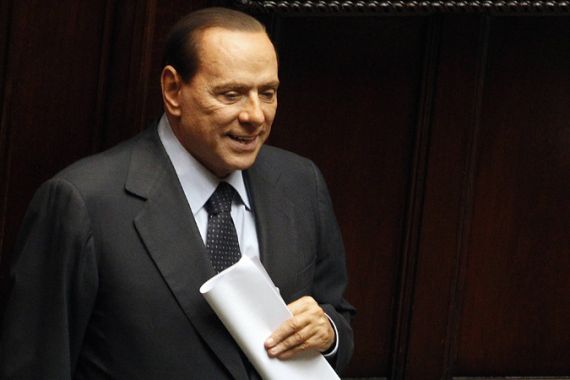Berlusconi’s comeback?
The 75-year-old former prime minister of Italy appears to be positioning himself for another shot at power.

A recent survey demonstrated how the greatest survivor of European politics, Silvio Berlusconi, could gain around 28 per cent of votes if an election in Italy was held today. The self-acclaimed “saviour of Italy”, who has styled himself as a popular hero, the man outside usual political circles, and close to the common people, is in fact preparing for an incredible political comeback.
“I need to do this for Italians,” he said. This is, in Berlusconi’s rhetoric, another “extreme sacrifice” for a country that, in his eyes, he “saved from communism” in the 1990s.
After serving three separate terms as prime minister, the 75-year-old lost his parliamentary majority amid the European debt crisis and resigned in November 2011.
Predictably, the man who compared himself with Napoleon could not give up his career so easily, and his hidden electoral campaign, along with popular disillusionment towards politics and economic uncertainty, are likely to continue to influence Italy’s political landscape.
International reaction
While reports of Berlusconi’s potential vote share may be slightly exaggerated and pompous, they were enough to generate turmoil both in finance and politics – reportedly singlehandedly alarming the US administration, Germany, international markets, the European Central Bank, Mario Monti’s government and other Italian parties.
Despite some comments across the globe on the diminishing likelihood of a potential Berlusconi victory in the 2013 elections, there is, however, a realistic chance that the media tycoon could make an “influential” political return. Given the current economic and socio-political situation, there are real grounds for such a prediction.
| The political life of Silvio Berlusconi |
Politically, the centre-left lacks any strong leader or clear strategy. It is ambiguous about future electoral alliances and unsure whether to promote another Monti-style large coalition, moving further towards the centre-right, or whether to look to its leftist side. Historically, the weakness of the Italian left has contributed to Berlusconi’s strength.
The political right is similarly missing convincing leadership, and Berlusconi seems, so far, the only credible option for a good number of right-wing voters – and a potential source of unity and new dynamism amid his divided party. This positioning appears to mirror the whispers of Tony Blair’s return to British politics.
Furthermore, Berlusconi will be probably running an electoral ticket with a woman as his deputy leader. This is designed to regain popularity (among women and some Catholics) after the Bunga-Bunga scandal and criminal allegations – several of which have developed into ongoing court cases – accusing the former leader of mafia collusion, tax fraud, corruption, and membership of the covert Propaganda Due (P2) Masonic lodge (itself at the centre of several murderous “shadow government” conspiracies spanning decades and continents).
Potential opposition
Socially, the growing popularity of the “anti-politics” and anti-corruption Five Star Movement, led by popular comedian Beppe Grillo against the immorality of politicians, shows just how vigorous the call for a new type of politics is. In truth, however, one should wonder if “anti-politics” is the idea represented by this new movement – albeit, at times, in a somewhat demagogic fashion – or if, more pertinently, “anti-politics” is represented by the corrupted, Bunga Bunga, scandal-led school of much of the existing political class.
Interestingly, “austerity life” in southern Europe demonstrates, nonetheless, how even a network of disenchanted, but angry citizens can reach a political and electoral impact in many local areas, and, according to some polls, Grillo’s movement may become one of Italy’s largest parties in a future parliament.
Berlusconi is brightly, but somewhat paradoxically, aiming to exploit these new social circumstances. He will soon reshape and rename his own “People of Freedom” party. It will reportedly again be called “Go Italy”, or maybe “Great Italy”. This will be a social network-friendly movement (as is Grillo’s), with younger candidates, and the “purging” of some of the elected former pin-up girls and the less loyal old MPs.
Economically, his recent grassroots activity has reportedly included meetings with industrialists, civil society groups and economists to discuss the euro and the financial crisis. He is aware that if the situation does not improve and “austerity” remains the key mantra, Monti’s popularity may decrease after the summer.
Monti’s spending reviews are going to affect both the public sector and the welfare system. New taxation policies and restrictions of the job market will have a further impact on people’s lives. In southern Italy – an area neglected by the current government – one family in four is defined as being in poverty, and current data indicates that, nationally, poverty blights eight million Italians.
Berlusconi’s recent anti-euro and anti-Berlin stances are simply attempts to exploit some of the fears of these most vulnerable citizens, and resonate with some of the “anti-politics” sentiments.
All this will not lead to any certain electoral victory for Berlusconi, as he will probably lack a coherent electoral coalition, and will still need to convince a majority of Italians of his suitability to return to office. But this might contribute to a potential fragmentation of the vote – and this may be Berlusconi’s main aim.
This would be for him the only way to uphold political and economic power – and to influence a quarrelling parliament and the workings of another semi-technocratic grand coalition. It would also have unpredictable consequences across the whole eurozone, as well as impacting both Italy’s foreign relations and its domestic political stability.
At the same time, however, it will certainly ensure the cultural persistence of Berlusconism.
Andrea Mammone is a historian at London’s Kingston University and co-editor of Italy Today: The Sick Man of Europe (Routledge, 2010) and Un Paese normale? (Dalai editore, 2011). He has also been a political commentator for the BBC, Sky News, Voice of America, The Independent, Foreign Affairs and the International Herald Tribune.
Follow him on Twitter: @Andrea_Mammone
